It’s No Small Thing: Tips on Making Small Talk
Whether working from home or at the office, you will probably have to engage in an important social practice: small talk. But after a year of working remotely, do we still remember how to do it?
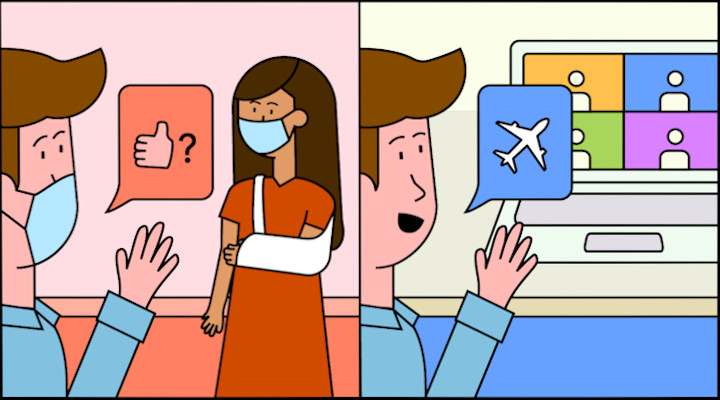
Small talk is either a painful social ritual or a pleasant conversation filler, depending on who you ask. But most of us can agree that it is an essential and unavoidable part of working life.
These informal conversations can be as simple as talking about the weather or our hobbies. Any discussion that does not have an aim or seek to fulfil a transaction (such as negotiating a pay raise) could be considered small talk.
One study conducted by American management professors shows that small talk is actually beneficial in the workplace. It builds rapport and deepens trust between colleagues. It also serves as a buffer in conversations, helping us transition to more serious topics like negotiations and performance evaluations.
How COVID-19 made small talk difficult
After socially distanced living amid COVID-19, our social skills may have gathered dust after months of disuse. The usual topics for small talk have also become less effective because of the impact of the pandemic.
For example, asking someone “what have you been up to today?” may be uninspiring when people’s daily activities are limited due to COVID-19 restrictions. Similarly, asking someone “how are you?” might seem inane because of the mutual understanding that people are not expected to be doing fine.
Nevertheless, there are many ways we can have enjoyable small talk. Keep these conversation tips in mind the next time you are talking with your colleagues.
Conversation do’s and don’ts
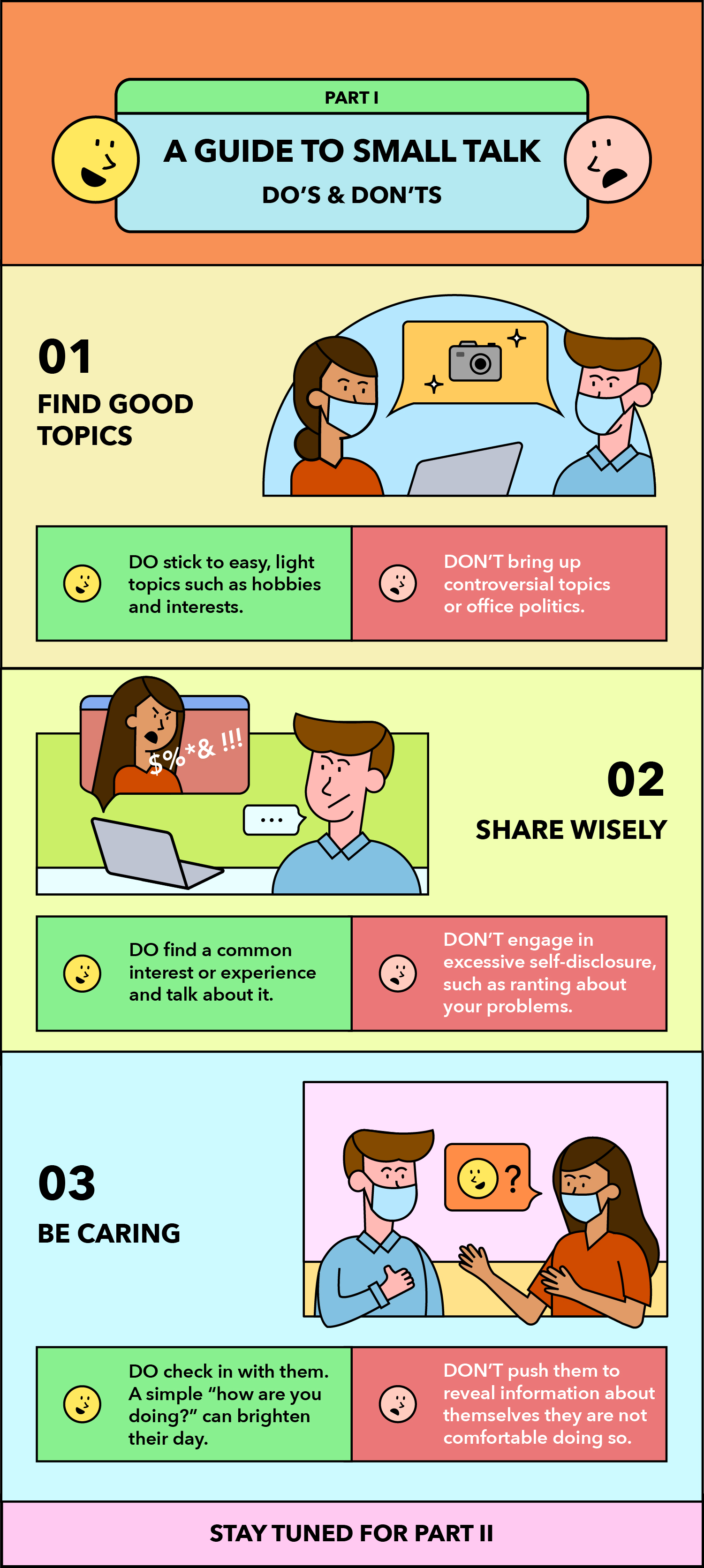
However, if someone decides to confide in you about not being ok, be sure to give them time and space to pour their hearts out, as Singapore Civil Defence Force lead psychologist Khoo Swee Giang suggests in a Challenge Podcast episode.
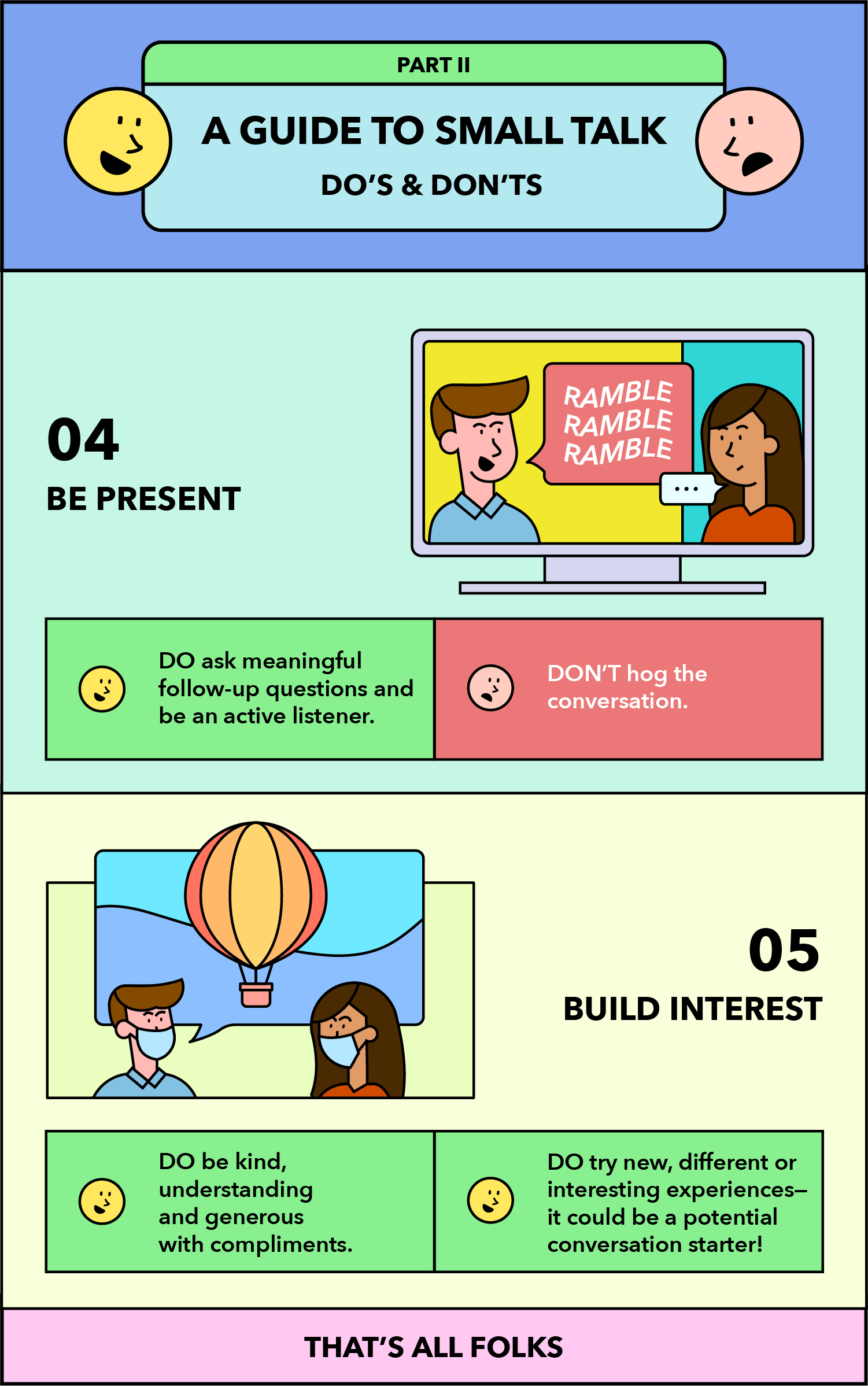
Making time for small talk
If work from home is the default arrangement, there may be fewer opportunities to engage in small talk. After all, other than emails, text messages and scheduled video calls, you will likely not be interacting much with your colleagues.
However, there are ways to continue making informal conversations a part of your regular workday:
- Set aside time in team meetings for small talk. This can be before or after you have covered your meeting agenda.
- Start team meetings with an icebreaker or an individual check-in. As the team grows into the routine, they may become more comfortable transitioning to other conversational starters.
- Ask for opinions. It is useful during meetings to occasionally bring up topics or questions that have no right answer and allow for your team members to voice their opinions. This creates space for small talk to occur.
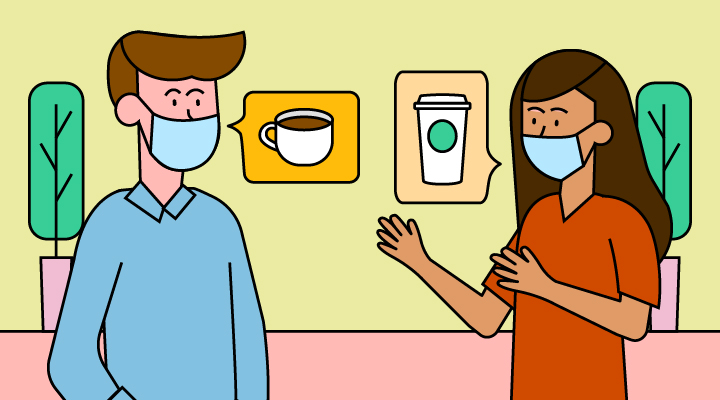
Talking virtually or masked up – how to read non-verbal cues
Talking to people while wearing a face mask can be challenging. Masks muffle our voices, potentially causing tension because of mishearing or misunderstanding. Being unable to read the other person’s facial expressions also makes it harder for us to gauge their response.
Similarly, talking to someone over video can be difficult. Poor video or audio quality are issues that many of us are familiar with. Picking up on someone’s discomfort, or gauging how focused they are, is also harder to do on screen, especially if your cameras are turned off.
When this happens, it is useful to pay attention to other non-verbal cues such as body language, eye contact and tone of voice.
Non-verbal communication is an important part of conversations, as Eva Berkovic, a cognitive behavioural therapist, explains. Words are easier to control and do not always fully reflect the other person’s thoughts. For example, we can say out of politeness that we agree with someone, but our body language might reveal otherwise.
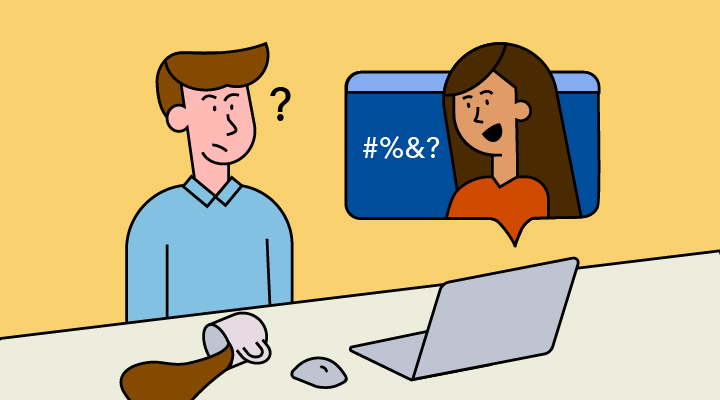
To overcome the communication barrier that masks and video platforms impose, follow these tips on reading non-verbal cues:
- Take note of their posture. A person who is responding well will lean towards you (or their camera), with a relaxed posture and hands at their sides.
- Maintain eye contact. Look your colleague in the eye while you talk to them to show that you are listening and interested in what they have to say. If you are on video, occasionally look into the camera to mimic eye contact.
- Verbal affirmations such as “I see” and “that’s true” can replace facial expressions to show that you are invested in the conversation. On video, this can be useful if you are dealing with poor video quality or have multiple participants.
- Be patient and understanding. Ask your colleague to repeat themselves if you didn’t hear them, and do the same if they ask you.
- Enunciate your words clearly so that you can be better heard. However, avoid raising your voice as this could change what you are trying to say.
- When in doubt, ask and clarify what they meant.
It is important to remember that although small talk has its unsaid rules and conventions, how you hold a conversation with a colleague ultimately depends on your level of comfort and closeness with each other. Go with the natural flow of the conversation, and pay attention to your colleague’s response to gauge where your discussion should go next.

To get more stories like this, subscribe to the Challenge newsletter or follow the Challenge Telegram channel.
- POSTED ON
Oct 25, 2021
- TEXT BY
Hidayah Md Sham
- ILLUSTRATION BY
Lei








